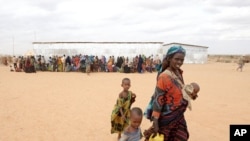Ethiopia, one of Africa's poorest countries, is heralding great strides in eradicating poverty. The number of Ethiopians living in poverty has dropped below one-third of the total, despite population growth and soaring inflation.
Finance Ministry officials told donor organizations Friday that about 25 million of Ethiopia's 80 million people live below the poverty line. That figure represents a reduction of four million since 2004, even as the population has grown at a rate of more than two and a half percent a year.
Economists say the poverty line is based on a complex formula including food consumption. Ethiopia's poverty line is well below the internationally accepted rate of $1.25 a day.
Considering that the current rate of inflation is about 35 percent, Minister of State for Finance and Economic Development Abraham Tekeste called the decline in poverty a “remarkable achievement."
"The report has shown that poverty has declined overall in the country in spite of the global and national shocks that Ethiopia experienced in terms of increases in prices, drought in some pockets of the country despite all these shocks, [and] the financial and economic crisis in the world," Abraham said.
International economists attending the briefing called the figures encouraging. But World Bank Country Director for Ethiopia Guang Chen expressed concern that inflation is undermining further progress.
"The trend is very positive, but at the same time, as the state minister says, still we're talking about 30 million people below the poverty line, and this is a very poor country, and when we're talking about rural poverty line, their poverty line is actually below the world accepted average. So there's still a lot of work to be done," Chen said.
The World Bank's lead economist on poverty reduction in Africa, Chorching Goh, cautioned that while Ethiopia's growth figures over the past decade are impressive, they start from a very low statistical base. She said the Human Development Index that ranks countries by living standards still shows Ethiopia near the bottom.
"We have to commend efforts of the people and government. However, HDI, in 2011, out of 187 countries, Ethiopia we are at 174, and ten years ago out of 163 countries were are 159, so in terms of our relative position, we haven't moved forward that much. What does that say? It just says other countries are progressing very rapidly, too,
Goh said.
Goh noted that Ethiopia is still in an early stage of development, with per capita income below $400 a year.
She and other economists are urging Ethiopian policy makers not to focus too much on closing the gap in income inequality.
Finance Ministry officials said Friday they had made progress in narrowing the inequality gap. But Goh noted that the history of developed countries teaches temporary inequality is a necessary result of growth. She urged Ethiopian officials to be patient when it comes to inequality, and impatient when it comes to the eradication of poverty.
News
Ethiopia Hails Poverty Reduction




